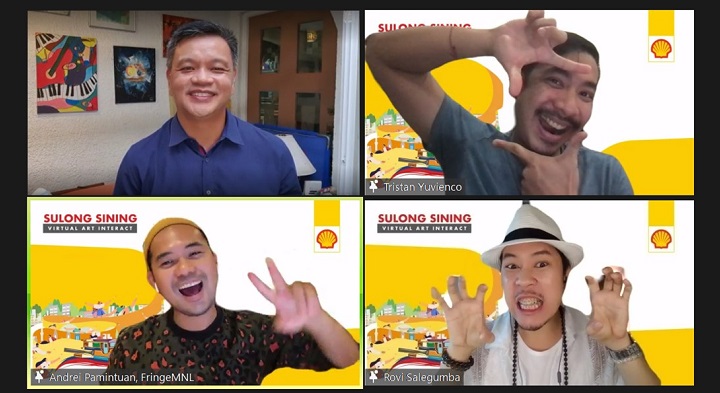
Young artists captured the universe of kapres, tikbalangs, and other characters in Philippine mythology at the recent Shell NSAC Virtual Art Interact.
During the second leg of the three-part virtual series, this year’s theme “Sulong Sining” (“Art Advances”) was illustrated by Philippine fantasy artists delving into the country’s folklore. Serge Bernal, Pilipinas Shell Vice President for Corporate Relations, said, “Sulong” means charging forward and “sining” means art. The theme really encourages students to share their creative talents and showcase the bright future that they envision through the arts.”
The discussions between the renowned artists and young creatives revolved around the origins of popular supernatural entities, how these stories were passed on to generations through word of mouth, their modern relevance, and translating the insights into sketching compositions.
Gods and spirits
As seen on the internet today, ancient Philippine myths and creatures are taking on a new life, capturing the imagination of a new generation of visual storytellers who are giving them diverse interpretations.
Digital artist Tristan Yuviengco’s workshop featured Pinoy cryptid character design, based on his research from both oral traditions and modern depictions: “I like grabbing stuff from existing media and from nature,” he explained his process. “Kumuha ako ng [I got] photos ng balete tree, a mythical tree in a lot of media. I got modern depictions of diwata, a fairy or a nature spirit; minsan god siya [sometimes it is a god]. That is what is very interesting about Philippine myths: sobrang [very] diverse talaga from the oral traditions which I wish will be preserved.”
Other characters that the student artists illustrated were the Visayan ugang-ugang portrayed in a whimsical rather than grotesque manner, and a kapre illustrated as a tree with arms and legs.
Yuviengco voiced that these modern representations of other creatures like the manananggals and tikbalangs are important because they “still keep the essence” of the myths “but still innovate: “Sometimes they even add a fantastical thing that I’ve never heard of pero sabi nila [but they said] that’s what their parents told them. That’s very fascinating and I’m excited to see more.”
Cultural evolution
Meanwhile, NSAC alumnus Rovi Salegumba reiterated that “for culture and tradition to evolve and survive, it needs to adapt. I actually see it getting modernized. I’m excited to see how the future generations would re-envision or reinterpret traditional stories such as mythical creatures.”
He added that this newfound interest in Filipino mythology is still extending to other parts of our ancient culture such as the baybayin script or the written language of the pre-Hispanic dwellers of the more than 7,000-island archipelago. “We have a rich cultural heritage,” he emphasized. “It’s part of our identity and my art is all about celebrating it. I want people to encourage our rich culture.”
As this period of cultural evolution in Philippine art unfolds, Yuvienco, who also works in animation, sees Filipino culture extending internationally: “I would see art from Filipinos outsourced abroad. I’ve also been seeing great and amazing projects and ideas made with Filipino voice and these ideas would always promote culture and new stories in a new and innovative kind of light. We have so many stories and so many ideas and I feel we’re definitely one to tell them to the world and to other people.”
With its decades-long history, Pilipinas Shell’s NSAC continues to be a platform to develop and nurture young Filipino visual artists. The longest-running student arts competition in the country remains on the move towards harnessing Filipino artistry through opportunities for budding artists to develop their craft by learning from Shell NSAC alumni and established personalities in the art scene.

